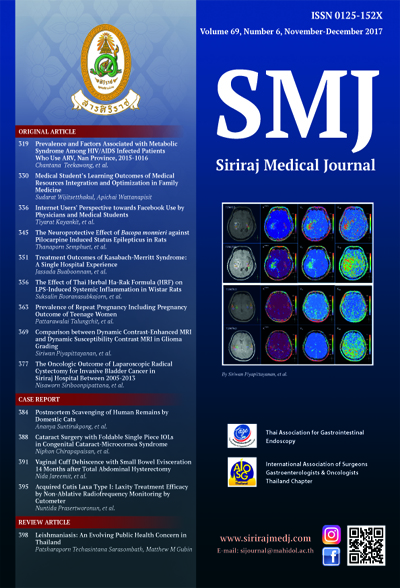The Effect of Thai Herbal Ha-Rak Formula (HRF) on LPS-Induced Systemic Inflammation in Wistar Rats
Keywords:
Thai herbal formula; Ha-rak; lipopolysaccharide; systemic inflammation; anti-inflammatory effectAbstract
Objective: To study effects of Thai herbal Ha-rak formula (HRF) on lipopolysaccharide (LPS)-induced systemic inflammation in rats.
Methods: Male Wistar rats (190-250 g) were orally treated with HRF for 14 days before they were induced with LPS (6 mg/kg, i.v.). The markers of organ injury/dysfunction and pro-inflammatory cytokines were measured at 6 hours after LPS administration.
Results: LPS administration can significantly increase all markers. Intragastric administration of 5 mg/kg indomethacin, the positive control, significantly reduced plasma urea, creatinine, aspartate transaminase (AST), alanine transaminase (ALT), creatinine kinase (CK), tumor necrosis factor alpha (TNF-α), interleukin (IL)-1β, and IL-6. HRF trends to attenuate the plasma AST, ALT, CK, TNF-a, and IL-1β, although these effects were not statistically significant. Moreover, all doses of HRF did not increase plasma urea, creatinine, AST, ALT, CK, and lipase, when compared
to sham.
Conclusion: HRF trends to protect against endotoxemia-induced organ injuries and pro-inflammatory cytokines. Furthermore, rats that received HRF did not show organ injuries.
Downloads
Published
How to Cite
Issue
Section
License
Authors who publish with this journal agree to the following conditions:
Copyright Transfer
In submitting a manuscript, the authors acknowledge that the work will become the copyrighted property of Siriraj Medical Journal upon publication.
License
Articles are licensed under a Creative Commons Attribution-NonCommercial-NoDerivatives 4.0 International License (CC BY-NC-ND 4.0). This license allows for the sharing of the work for non-commercial purposes with proper attribution to the authors and the journal. However, it does not permit modifications or the creation of derivative works.
Sharing and Access
Authors are encouraged to share their article on their personal or institutional websites and through other non-commercial platforms. Doing so can increase readership and citations.











